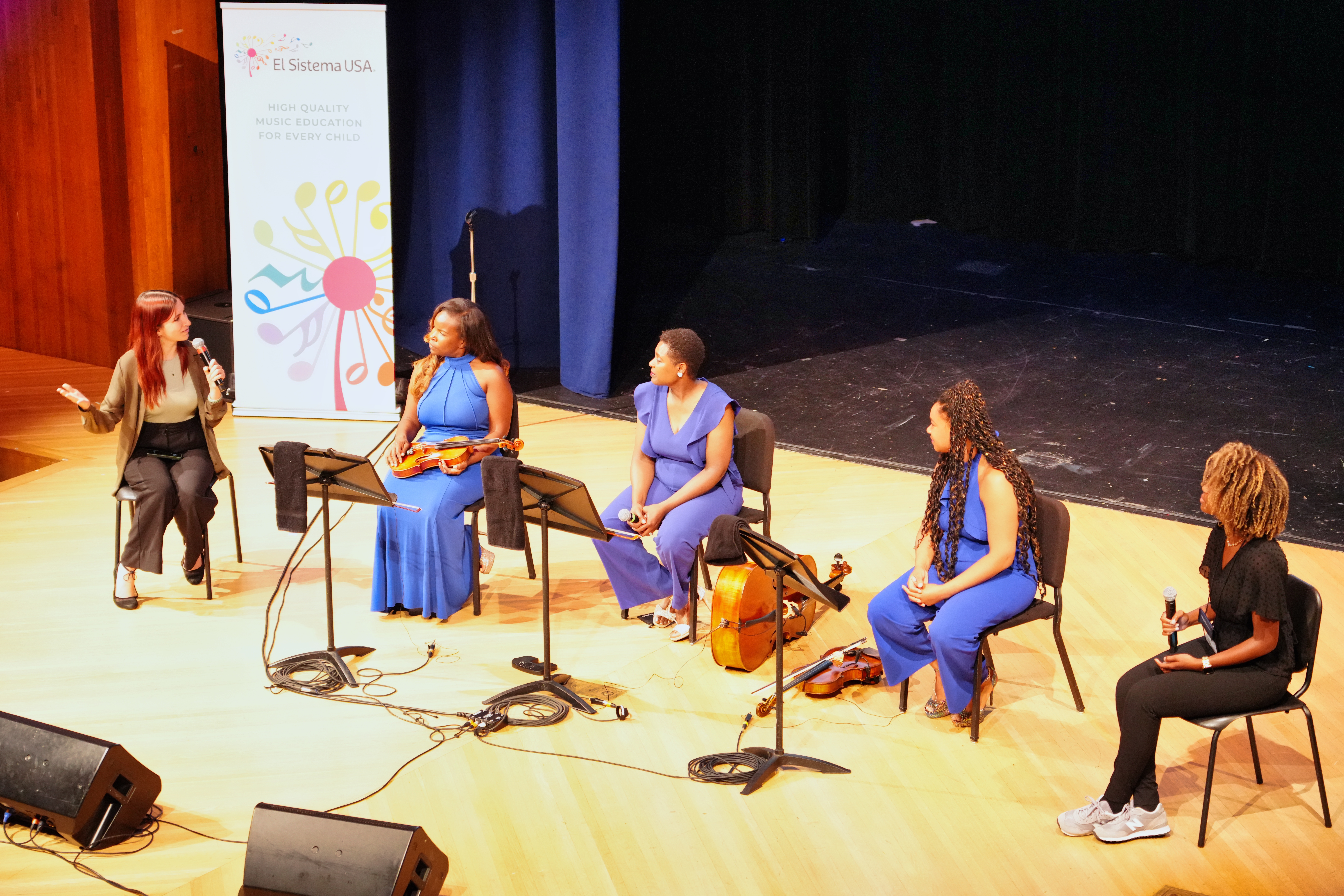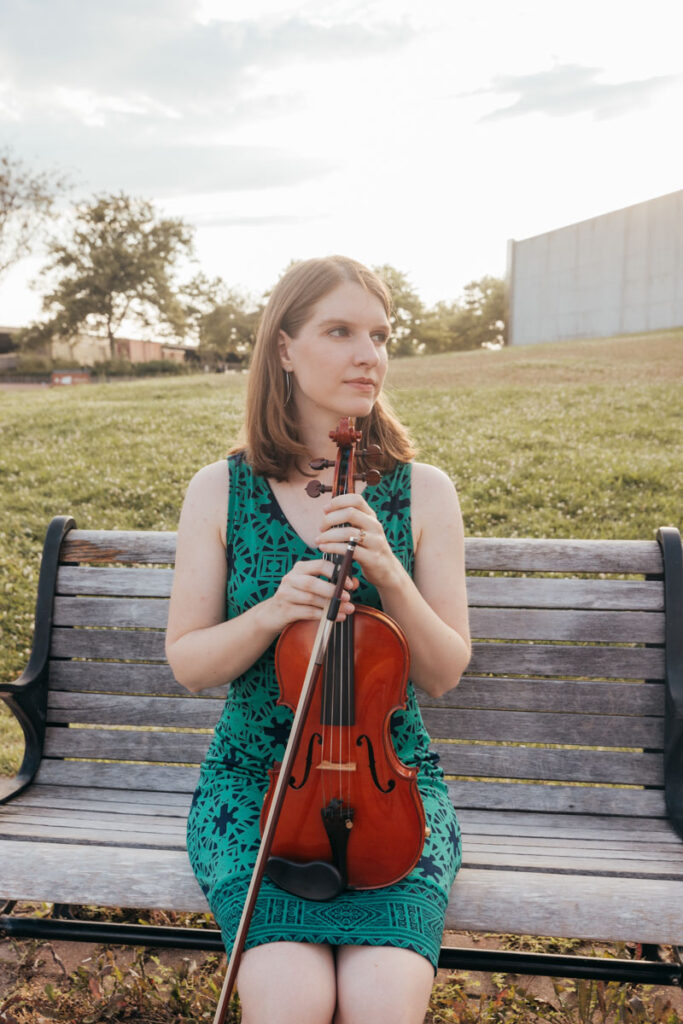
Topics
News & Resources
2019 Cohort of Global Leaders Program Gathers in Chile
Mark Churchill, Dean Emeritus, New England Conservatory, and Founder, El Sistema USA

Thirty-eight members of this year’s Global Leader Program cohort traveled to Chile for two weeks last month to learn, collaborate, build relationships, teach, and put into action their passion for harnessing the power of music to serve community and education. Each one came away with a deeper commitment to their aspirations and heightened zeal for their work as cultural agents, social entrepreneurs, and teaching artists.
The Global Leaders Program, an initiative of The Orchestra of the Americas with support from The Hildegard Behrens Foundation, is designed to empower a rising generation of change-makers in music to transform lives and communities through an innovative nine-month on-line curriculum (page 8 here) partnered with 10-day field work opportunities throughout world. Led in collaboration with 10 top universities and think tanks, distinguished module directors, a world-class faculty that includes two Nobel Laureates, and a network of institutional fieldwork hosts spanning 30 countries, the program is offered annually to a select Cohort of 40 of the most promising emerging social/educational/musical young leaders from around the globe.
The GLP is closely connected with the worldwide El Sistema movement. Many of the cohort members are associated with self-identified El Sistema inspired programs throughout the Americas and the world, and many graduates go on to initiate or further develop such efforts. GLP module directors include WE publisher Eric Booth, El Sistema USA executive director Katie Wyatt, founder and CEO of “Play on Philly” Stanford Thompson, and Josiah Quincy Orchestra Program executive director Chris Schroeder. Numerous friends and leaders from the worldwide El Sistema moment are represented on the faculty such as Judith Hill Bose, Juan Antonio Cuellar, Richard Hallam, Ken MacLoed, Hilda Ochoa-Brillembourg, Aristides Rivas, Dalouge Smith, Daniel Trahey, Deborah Wanderly and Jessica Zweig.

Safira Antzus and Darren Young are two recent GLP graduates. Only months after completing the GLP, Safira, a highly trained pianist, became artistic director and conductor of El Sistema Greece, an initiative working to integrate refugee youth in Athens. In her own words: “The GLP gave me the vocabulary, practical experience, and confidence to seek this opportunity and pass all rounds of the job application.” Darren, an experienced conductor and violist who was already Music Director of the National Youth Orchestra of Jamaica when he was admitted into the program, has now created a strategic plan for the growth of the organization, involving intensive recruitment of 200 new students, and the opening of a new center in 2019. Beyond this, he has provided opportunities for cohort members of his class as teaching-artists-in-residence to promote the motivation of his students and staff. Find some inspiring words from Darren here.
Pedro Zenteno, academic director of the GLP, states, “The effectiveness of the GLP is grounded in its multidisciplinary nature. We believe that the kind of innovation our industry needs will come from cultural agents who are trained both academically and practically for rich lives of social entrepreneurship, and for work as teaching artists and community leaders.”
This January’s full cohort residence in Chile is the centerpiece of the annual GLP experience. The cohort first spent a week together in the foothills of Patagonia, in Frutillar (the UNESCO-nominated “Creative City of Music” ), learning from a team led by Dr. Doris Sommer of Harvard University’s David Rockefeller Center for Latin American Studies and director of Harvard’s Cultural Agents Initiative. Dr. Sommer focused on propelling artists into action in the civic space to create or expand projects that utilize the power of music in service of their communities.

The second focus of the week was a series of interactions by teams of GLP members with representatives from a number of NGO’s in the Frutillar region. The goal was to help the Chilean NGO leaders reflect on who they are; the processes by which they create, deliver, and capture value; and the challenges they are facing, using the theory of change logic model and completing a “social business model canvas.” On the last afternoon of the week in Frutillar, all local organizations came together for a forum where cohort teams presented a summary of their work to the community at large (see first photo). The sense of friendship, appreciation and learning from both sides was thrilling to experience.
In the second week, small cohort teams fanned out to eight regional music education programs in Chile to work hands on with leaders, teachers, and supporters. Again, the sense of sharing, mutual inspiration, and creative possibility was palpable, and many long-lasting collaborative associations were kindled between the cohort visitors and their Chilean mentors and colleagues.

At one of the sites, Dan Trahey led a second year of the “El Sistema Educators Bootcamp,” which was launched last year in Honduras and gratefully appreciated by all who participated. Read WE coverage here.
I was present when Maestro Abreu addressed the first class of Abreu Fellow in Caracas in 2009 before they spent six weeks working in numerous nucleos throughout the country. He said (I paraphrase): “Treaties, written agreements, proclamations, speeches, etc. mean almost nothing in building true international relations and mutual understanding. The only thing that really counts is individuals coming together around a common noble cause, working shoulder to shoulder, and exploring together ways to deepen their contribution to the advancement of mankind.” The Global Leaders in Chile was, without doubt, a shining example of that theory in action.
Author: Mark Churchill, Dean Emeritus, New England Conservatory, and Founder, El Sistema USA
Date Published: 1 February 2019
Cohorte de Líderes Globales 2019 se reúne en Chile
38 miembros de la cohorte actual del Programa de Líderes Globales viajaron a Chile por dos semanas el mes pasado para aprender, colaborar, construir nuevos lazos, enseñar, y poner en acción su pasión por emplear el poder de la música para servir la comunidad y la educación. Cada uno terminó la visita con un compromiso profundizado con sus aspiraciones y un fervor intensificado por su trabajo como agentes culturales, emprendedores sociales, y artistas formadores.
El programa de Líderes Globales (GLP), una iniciativa de la Orquesta de las Américas, está diseñado para empoderar a una generación ascendente de líderes de cambio en la música que transformen vidas y comunidades a través de un currículo innovador online que dura 9 meses. Además se añaden oportunidades de 10 días de trabajo de campo por todo el mundo. Dirigido en colaboración con 10 de las mejores universidades y think-tanks, directores distinguidos de módulos, profesores de primera clase que incluyen dos premios Nobel, y una red de anfitriones institucionales que incluyen 30 países, se ofrece el programa anualmente a una cohorte selecta de 40 de los líderes jóvenes emergentes sociales/educacionales/musicales más prometedores de todas partes del mundo.
El GLP tiene lazos estrechos con el movimiento global de El Sistema. Muchos de los miembros de la cohorte están asociados con programas que se identifican como inspirados por El Sistema, por todas la Américas y el mundo, y muchos graduados del programa pasan a iniciar o desarrollar esfuerzos de este tipo. Los directores de módulos del GLP incluyen Eric Booth, editor del WE, Katie Wyatt, directora ejecutiva de El Sistema USA, Stanford Thompson, fundador y CEO de “Play on Philly,” y Chris Schroeder, director ejecutivo del Programa Orquestal Josiah Quincy. Varios amigos y líderes del movimiento global de El Sistema están representados entre los profesores, como Judith Hill Bose, Juan Antonio Cuellar, Richard Hallam, Ken MacLoed, Hilda Ochoa-Brillembourg, Aristides Rivas, Dalouge Smith, Daniel Trahey, Deborah Wanderly, y Jessica Zweig.
Safira Antzus y Darren Young son dos graduados recientes del GLP. Solo unos meses después de completar el GLP, Safira, una pianista de alto nivel, se volvió directora artística y de orquesta de El Sistema Grecia, una iniciativa que trabaja para integrar jóvenes refugiados en Atenas. En sus palabras: “El GLP me dio el vocabulario, la experiencia práctica, y la confianza para buscar esta oportunidad y pasar por todas las etapas de la postulación al trabajo.” Darren, un violista y director de orquesta con experiencia que ya era director musical de la Orquesta Juvenil Nacional de Jamaica cuando entró en el programa, ahora ha creado un plan estratégico para el crecimiento de la organización, que involucra el reclutamiento intensivo de 200 nuevos estudiantes, y la inauguración de una nueva sede en 2019. Además, ha brindado oportunidades para los miembros de su cohorte como artistas formadores en residencia para promover la motivación de sus estudiantes y profesores. Aquí hay unas palabras inspiradoras de Darren.
Pedro Zenteno, director académico del GLP, dice, “La eficacidad del GLP está basada en su esencia multidisciplinaria. Creemos que el tipo de innovación que necesita nuestra industria vendrá de agentes culturales que están formados académicamente y de una manera práctica para vidas ricas de empredimiento social, y para trabajar como artistas formadores y líderes comunitarios.”
La residencia de enero para la cohorte entera en Chile es el punto fuerte de la experiencia anual del GLP. Primero, la cohorte pasó una semana juntos en la falda de la Patagonia, en Frutillar (nombrado por UNESCO “Ciudad Creativa de la Música”), aprendiendo de un equipo dirigido por la dra. Doris Sommer del Centro David Rockefeller para Estudios Latinoamericanos de Harvard University, y directora de la Iniciativa de Agentes Culturales de Harvard. La dra. Sommer se enfocó en propulsar a los artistas hacia la acción en el espacio cívico para crear o expandir proyectos que utilizan el poder de la música en servicio de sus comunidades.
El segundo enfoque de la semana fue una serie de interacciones entre equipos de miembros del GLP con representantes de varias ONGs en la región de Frutillar. El objetivo fue ayudar a los líderes de las ONGs chilenas a que reflexionen sobre quienes son; los procesos a través de los cuales crean, brindan, y capturan el valor; y los retos que están enfrentando, utilizando el modelo lógico de la teoría del cambio y completando un “lienzo de modelo de negocios sociales.” En la última tarde de la semana en Frutillar, todas las organizaciones se reunieron para un foro donde los equipos de la cohorte presentaron un resumen de su trabajo a la comunidad en general (ver la foto). Fue emocionante presenciar la sensación de amistad, aprecio, y aprendizaje de ambos lados.
En la segunda semana, pequeños equipos de la cohorte se dispersaron en ocho programas regionales de educación musical en Chile para trabajar de la mano con líderes, profesores, y otros que apoyan. Otra vez, la sensación de compartir, inspiración mutua, y posibilidad creativa fue palpable, y muchas asociaciones colaborativas duraderas fueron encendidas entre los visitantes de la cohorte y sus mentores y colegas chilenos.
En uno de los sitios, Dan Trahey dirigió el segundo año del “Bootcamp para Educadores de El Sistema,” que se lanzó el año pasado en Honduras y fue valorado y recibido con gratitud por todos los participantes. Lee la cobertura del WE aquí.
Estuve presente cuando el Maestro Abreu habló con la primera clase de Abreu Fellows en Caracas en 2010 antes de que pasaron seis semanas trabajando en varios núcleos por todo el país. Dijo (resumo): “Tratados, acuerdos escritos, proclamaciones, discursos, etc. no significan casi nada en la construcción de verdaderas relaciones internacionales, de entendimiento mutuo. La única cosa que realmente importa es que los individuos se reúnan por una causa noble común, trabajando hombro a hombro y explorando juntos maneras de profundizar su contribución al avance de la humanidad.” La visita de los Líderes Globales en Chile fue, sin duda, un ejemplo brillante de aquella teoría en acción.
Por Mark Churchill, Decano Emeritus del Conservatorio de New England y fundador de El Sistema USA
Related Content
All Regions, News and Resources, North America, Student Voice & Leadership, Toronto
Sistema Toronto Students Release Hip-Hop Track ‘Earth’
longy-admin
All Regions, Ambassadors, Community Building, Featured, News and Resources, North America, Professional Development

The El Sistema USA National Symposium: A Report from a First-Timer
longy-admin

Featured, North America, Strings, Student Voice & Leadership, Teaching & Learning

YOLA Gives ‘Collective Composition’ New Meaning
longy-admin

All Regions, Collaborations, Community Building, Editorials, North America, Program Design, Research

EDITORIAL
A Musician’s Guide to Reaching for the Stars
longy-admin


